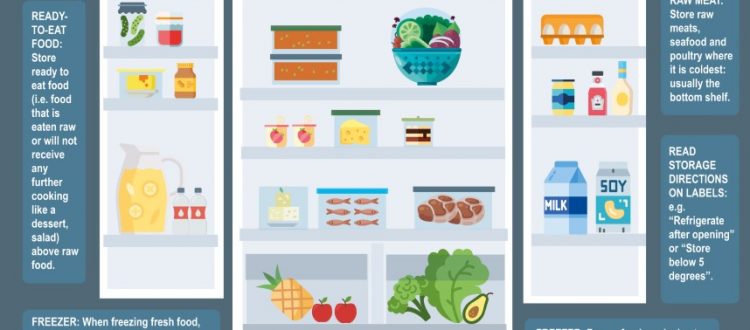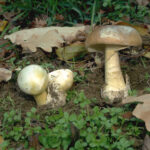
Fridge and freezer temperatures. Use a fridge thermometer to check if your fridge is running at 5C or below. Frozen food should be kept at -18C or below, which is the normal operating temperature of a domestic freezer or freezer compartment. At these temperatures, food should be frozen solid. While some models allow you to change and monitor the temperature, others don’t with manufacturers designing freezers to operate at -18C. It may be difficult to determine accurately the operating temperature of your freezer, so check that food looks and feels frozen to be sure your freezer is functioning correctly or use a thermometer if you have one covering this range. Partially frozen food will have a shorter shelf life. To ensure efficient operation, ensure that your freezer is defrosted to minimise the build-up of ice.
Date marking. The first thing to look out for is ‘best before’ or ‘use by’ dates on packaged foods Simply put: you must use (or freeze) a food by its ‘use by’ date or it could be a food safety risk while food with a ‘best before’ date will still be ok to eat after that date but it might have lost some nutrition or quality. Some foods liked canned goods with a long shelf life of more than 2 years don’t need a best before date as they last many years and it’s thought it would be used in that time. Remember to put the food you’ve just purchased at the back of the pantry or fridge so the older foods will be used first.
Check any storage instructions such as ‘keep refrigerated’ or ‘use with 3 days of opening’ as the use by/best before dates only apply to unopened food that is stored correctly. There might be foods like sauces or jams that you stored in the pantry in the past that now need refrigeration as they have less sugar or salt for health reasons.
Meat and poultry. Store any fresh meat or poultry in your fridge where it can’t drip onto other foods and use or freeze by its use by date or by 3 days if it is unpackaged. If you have defrosted too much meat or poultry then it is ok to refreeze it though it may lose some quality as freezing makes the cells break down and it becomes a little watery.
Vegetables should be stored in the vegetable crisper at the bottom of the fridge with the exception of potatoes which do best in a cool, dry cupboard. Don’t eat potatoes that have started to sprout as they can produce toxins that aren’t destroyed by cooking. You can use wilted veggies for soup or stock or add to casseroles.
Fruit.All fresh fruit, including tomatoes, should be stored outside of the fridge for better quality and washed just before you eat them. Excess fruit can be stewed and frozen and berries ‘blanched’ by dipping briefly into boiling water and then cold water and frozen on metal trays.
Eggs should be stored in the refrigerator still in the carton they came in to stop them picking up odours in the fridge and so you know the best before date. You can freeze excess eggs for up to a year – the easiest way is to beat them and put in a sealed container labelling them with the number of eggs and date. Defrost in the fridge and don’t use them in uncooked egg dishes. If you have your own chickens collect eggs regularly and don’t wash the eggs as this can push bacteria through the shell but wipe the eggs clean with paper towel then wash your hands with soap and water.
Dairy. Dairy products like milk, yoghurt and cheese should be refrigerated and used by their best before or use by date. Milk and hard cheeses can be frozen but may lose quality – grated cheese may freeze better.
Bread should be stored out of the fridge or it will dry out. Sliced bread can be frozen and you can defrost and use slices as you need them.
Bulk cooking of meals like soups, stews, curries and casseroles are a good way of using up excess food. Make sure you divide the cooked food into smaller containers (about the size of a takeaway container) as soon as it stops steaming and refrigerate or freeze. If large amounts of food cool too slowly then toxins can occur in them that can make you very ill.
Refrigerated cooked dishes or leftovers should be used or frozen within 2 to 3 days or 24 hours if you are pregnant, elderly or have a poor immune system because of the risk of Listeria food poisoning. Reheat to 75 degrees Celsius using a meat thermometer or the reheat function on your microwave following any prompts such as to stir the food.
Frozen food will last a long time in your freezer. It’s a good idea to label with the date it was frozen so you use the oldest first. The freezer door or lid or its manual will usually have a list of how long foods like meat, poultry, dairy, fruit and veg will last. Defrost food in the fridge or microwave not on the benchtop where food poisoning bacteria can grow. Follow any cooking instructions on packaged frozen food.



